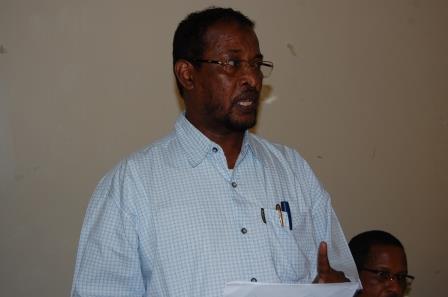A multi-agency team has been formed at Egerton University to fight soil acidity which reduces maize production on small- scale farms, raising food insecurity.
The United States Agency for International Development (USAID) through the ‘Feed the Future Advancing Local Leadership, Innovation and Networks (ALL-IN)’ programme has launched the effort which will be implemented by the University’s Tegemeo Institute of Agricultural Policy and Development to counteract soil acidity which cuts maize yields by at least 30 per cent.
The project’s Lead Principal Investigator and a research fellow at Tegemeo Institute of Agricultural Policy and Development Dr John Olwande said the initiative would involve over 4,000 farmers in counties of Bungoma, Kakamega, Trans Nzoia, and Uasin Gishu which were among the most important for maize production areas in Kenya.
“These counties are among those in which the government conducted soil tests in 2014 and found that the soils were highly acidic,” Dr Olwande said.
“The project’s goal is to address the high cost of soil management by involving stakeholders in the entire value chain of fertilizers and lime,” he added.
While speaking at the Njoro Main Campus during the launch, the Investigator indicated that the project would bring on board experts and stakeholders to build evidence on practical ways to encourage farmers to update their knowledge about the condition of their soils and encourage them to apply appropriate soil management practices.
Dr Olwande was flanked by co-director of ‘Feed the Future Advancing Local Leadership, Innovation and Networks (ALL-IN)’ Dr David Sarfo Ameyaw and Director of the ‘Feed the Future Innovation Lab for Markets, Risk and Resilience’ Dr Michael Carter.
He stated that the project planned to engage financial institutions, farmers, agricultural experts and community actors to revitalize soils and improve yields in the region.
“Few small-scale farmers test their soils to make soil management decisions. The project will support efforts by the government, development agencies, and private sector investors in promoting and facilitating proper soil management among farmers for sustainable agricultural productivity growth,” he said.
“This effort will get lime, inorganic and organic fertilizers and conservation agriculture to smallholder farmers who at present can only produce enough food to last three months, the other nine months becoming a long hungry season,” he added.
The project is expected to bring together researchers, financial institutions, lime and fertilizer companies, agro-dealers, civil society organizations, extension workers, and smallholder farmers to plan ways of implementing measures aimed at solving this problem.
Dr Ameyaw observed that over 7.5 million hectares of land in Western and Central regions were highly acidic, a challenge that was being experienced in many parts of Ethiopia, Rwanda, Uganda and Zambia.
“Agriculture is critical across Sub-Saharan Africa considering the challenge of feeding and employing a rapidly growing population in the coming years. This project is a game changer in terms of improving food security in Kenya,” he said.
The results from this project will provide guidance on promoting effective soil management for sustainable agricultural productivity growth in Kenya and across Sub-Saharan Africa.
By addressing widespread soil acidity, this project aligns with Feed the Future and USAID’s efforts in Kenya to expand economic opportunities for smallholder farmers and entrepreneurs to build resilience of households, communities, and markets to shocks and stresses – including climate change – and diversify agricultural production,” Dr Ameyaw pointed out.
He attributed the high acidity to leaching of nutrients due to abundant rains, continuous cultivation and wrong application of nitrogen fertilizers, which break down the soil forming acidic compounds.
Dr Carter noted that acidity prevents crops from utilizing the nutrients that remained in the soil, and that the application of calcium-rich lime, along with complimentary fertilizers and organic matter has been hampered by the high cost of lime, in particular the transportation cost, which kept it from reaching smallholder farmers especially in Western Kenya.
“This project will set out to test ways of relaxing the constraints that limit smallholder farmers’ adoption of lime and other soil management practices that can fundamentally improve their maize yields,” he said.
“The evidence from this project could even benefit smallholder farmers across the continent that faces the same challenge of soil acidity. We are about to show how a relatively small amount of resources can go a long way in solving the problem,” he observed.
A research begun by Kenya Agricultural and Livestock Research Institute (KALRO) and Egerton University has demonstrated the effectiveness of lime, especially in combination with other fertilizers, for treating acidic soils.
By Anne Mwale





